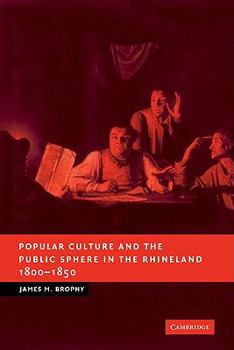Popular Culture and the Public Sphere in the Rhineland, 1800 1850
(Part of the New Studies in European History Series)
Select Format
Select Condition 
Book Overview
The age of revolution challenged the ancien r gime's political world, introducing Europeans to fresh ideals of citizenship. German society was no less affected. Following the Napoleonic era, a political culture of partisan choice undermined the official restoration of absolutism. Bourgeois and popular classes took part in the political landscape of civil society, producing an impressive social base for participatory politics by the 1830s. Because of severe restrictions on speech and assembly, ordinary Germans formed political opinions in irregular ways. This book looks at the sites and forms of culture that facilitated political communication. With chapters devoted to reading, singing, public space, carnival, violence and religion, James Brophy argues that popular culture played a critical role in linking ordinary Rhinelanders to the public sphere. Moving beyond conventional explanations of opinion formation, he exposes the broad cultural infrastructure that enabled popular classes to join the political nation.
Format:Paperback
Language:English
ISBN:0521123925
ISBN13:9780521123921
Release Date:January 2010
Publisher:Cambridge University Press
Length:384 Pages
Weight:1.24 lbs.
Dimensions:0.8" x 6.0" x 9.0"
Customer Reviews
0 rating





